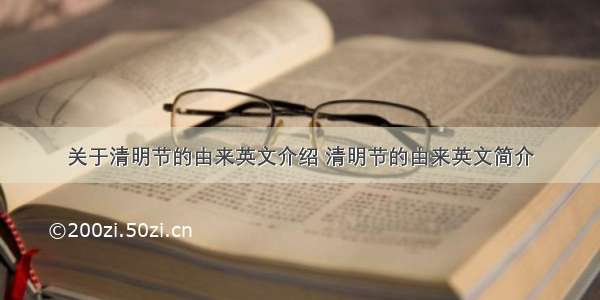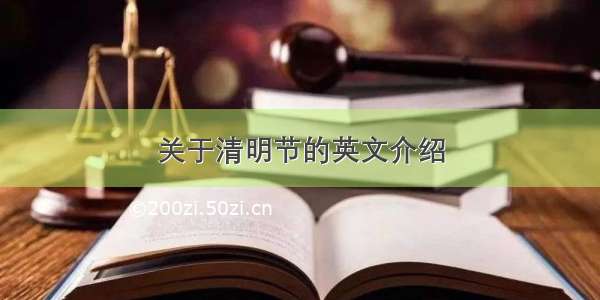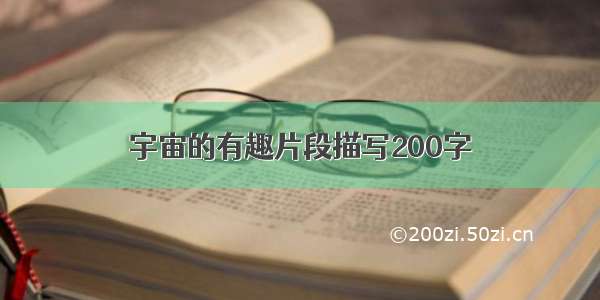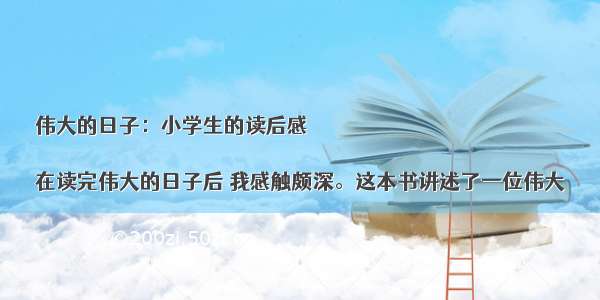
清明节,又称清明节、拜祖大典,是中国传统的重要节日之一。它被定在了每年的农历三月十五日,通常是阳历的4月4日或5日。清明节是一个传统的祭祀节日,在这一天,人们通常会前往祖先的墓地上拜祭,献上花圈、鲜花、食品、酒等物品,以表示对祖先的尊敬和感激之情。除了祭祖外,清明节还有扫墓、踏青等传统活动。
2. Origin of Qingming Festival
清明节的起源可以追溯到3000多年前的周朝时期,当时中国人形成了一种祭祀远古祖先的传统。清明节最早被称为寒食节,当时人们为了纪念战国时期的诸子百家之一的贤士管仲,不吃火热的食物,改为食用寒食,这种习惯延续到了今天。后来,清明节逐渐发展成为一个全民性的传统节日,也被写进了《节令》中。
3. Qingming Festival Customs
清明节是一个重要的祭祀节日,在这一天,人们通常会前往祖先的墓地上拜祭,献上花圈、鲜花、食品、酒等物品,以表示对祖先的尊敬和感激之情。除了祭祖外,清明节还有扫墓、踏青等传统活动。扫墓是清明节最重要的活动之一,它是祭祀祖先的核心。人们会在墓地上清理墓碑、墓地和周围的草木,然后点燃香烛,献上花卉和食品,向祖先表达敬意。踏青则是一些人假期时的一种娱乐方式,它是一种传统的春游活动,人们通常会选择山水环境优美的地方,欣赏春天的美景,感受大自然的魅力。
4. Qingming Festival Food
清明节还有一些传统的食品,最著名的是青团。青团是一种粘性的米糯团,有豆沙、芝麻、桂花等多种馅料,由于它的绿色外皮,因此得名“青团”。在清明节当天,人们通常会煮青团和清明粥,清明粥通常由糯米、红枣和枸杞制成,它有滋补身体的作用,是一份传统的清明节食品。
5. Qingming Festival Outside China
除了中国,在一些亚洲国家,如日本、韩国、越南等,也有类似的祭祀活动。例如,日本的彼岸节就是一个祭祖节日,它习惯在秋分节的前后举行,人们通常会前往祖先的墓地上祭拜。韩国的忌日则类似于清明节,人们会前往祖先的墓地上献上食品和鲜花,祭祀祖先。在越南,一些农民也会在清明节这一天祭拜祖先,但是年轻一代的越南人对这种传统渐渐产生了怀疑。
6. Conclusion
清明节是中国传统的祭祀节日,它是中华文化的重要组成部分。作为传统文化的一部分,清明节的文化内涵已经经过多次演变和发展,但是这种传统的祭祀与感恩的民众意识从未发生过改变。 包含拜祖、扫墓、祭拜、丧礼等习惯是中国传统文化的重要组成部分,它们代表了人们对先辈的尊重和感恩,同时也弘扬了中华民族的优秀文化。
清明节 (Qingming Festival) is one of the most important traditional Chinese festivals. It falls on April 4th or 5th each year, and is a time to honor and remember ancestors and loved ones who have passed away. In this essay, we will explore the meaning and significance of Qingming Festival, as well as some of the customs and traditions associated with it.
2. Origins and History
The origins of Qingming Festival can be traced back over 2,500 years to the Zhou Dynasty (1046-256 BC). During this time, people would offer sacrifices to their ancestors and perform various rites to ensure their well-being in the afterlife. The festival was originally called Hanshi (寒食节), or Cold Food Festival, because people were not allowed to light fires on this day as a sign of respect for the deceased. Later, the name was changed to Qingming Festival.
Over time, the customs and traditions associated with Qingming Festival have evolved. One of the most significant changes occurred during the Tang Dynasty (618-907 AD), when the emperor declared that the traditional practices of ancestor worship and tomb-sweeping could only be performed on a designated day, which became known as Qingming Festival.
3. Customs and Traditions
One of the most important customs associated with Qingming Festival is tomb-sweeping, or qingming (扫墓). This involves cleaning and decorating the tombs of ancestors, as well as offering sacrifices of food, wine, and other gifts. It is believed that these offerings will help the spirits of the deceased live comfortably in the afterlife. Tomb-sweeping is a deeply ingrained tradition, and it is common for families to travel long distances to pay their respects to ancestors.
Another important tradition is the playing of the game of cuju (蹴鞠), or Chinese football. This game has a long history and was traditionally played on Qingming Festival to encourage physical exercise and outdoor recreation. Today, it is still played in some areas of China, and is a popular activity for families and friends to participate in.
In addition to these traditions, there are also other customs associated with Qingming Festival. One of the most important is the consumption of qingtuan (青团), which are rice balls filled with sweet bean paste and wrapped in leaves. These are a special treat only eaten during Qingming Festival, and are said to bring good luck and prosperity.
4. Significance
Qingming Festival has great significance to the Chinese people, both culturally and emotionally. It is a time to remember and honor ancestors, and to show respect for those who have passed away. Tomb-sweeping is an important way to connect with ones roots and to maintain a sense of family and community.
In addition to its cultural significance, Qingming Festival also has a practical purpose. The custom of tomb-sweeping ensures that burial sites are kept clean and well-maintained, and that ancestral worship is properly carried out. This helps to establish a sense of continuity between the past, present, and future, and to maintain a strong sense of cultural identity.
5. Conclusion















